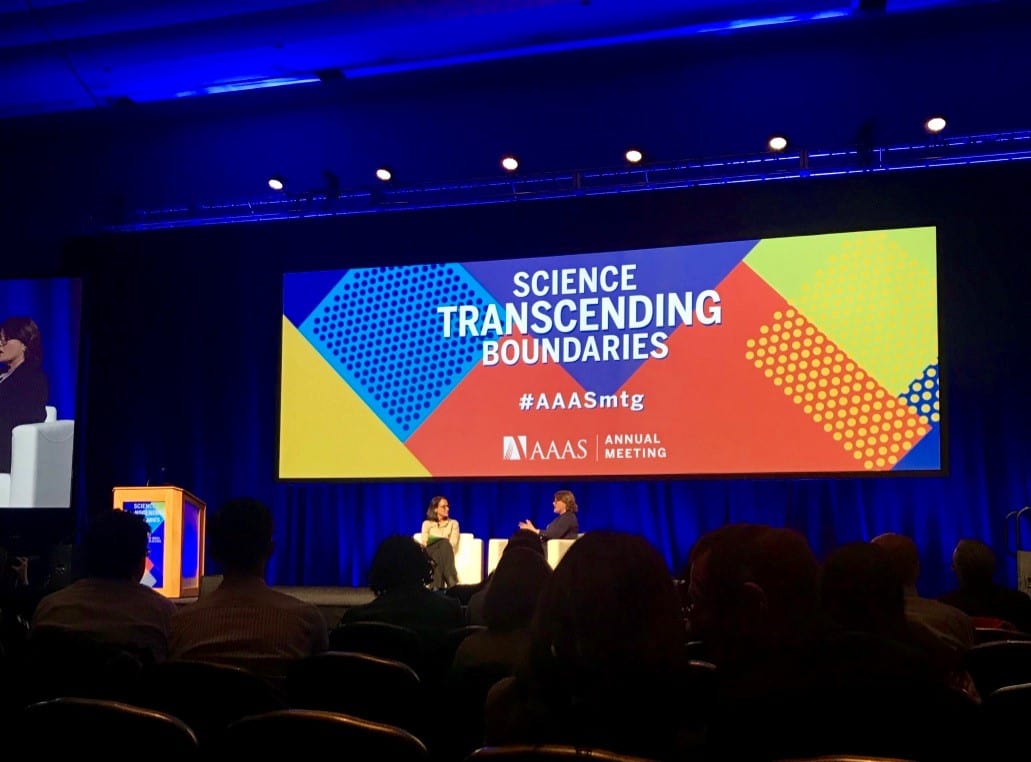Posted by: Eve Granatosky, PhD, 2018-19 Genetics & Public Policy Fellow
Earlier this month, I attended the Annual Meeting of the American Association for the Advancement of Science (AAAS), held right here in Washington, DC. Themed ‘Science Transcending Boundaries,’ the program featured sessions on how science can bring together people, ideas, and solutions from different disciplines and sectors to address the world’s most pressing problems. This conference was very different from others I’ve attended in the past, which have focused on one specific scientific area. The AAAS Meeting also had a strong focus on science policy and communication, and I was excited to attend those sessions as well as explore scientific talks in different areas.
A common theme across the policy and communication sessions was the importance of understanding your audience – what are their priorities, and what information is valuable and relevant to them? At one session, panelists discussed the many legitimate influences on policy and policymakers, and how scientific evidence is usually only one factor that contributes to decision making. In another, panelists spoke about the challenges of getting usable scientific information to policymakers, and described the important role of boundary organizations that span the science-policy interface in facilitating effective two-way communication. Later on in the conference, panelists discussed how science is frequently used strategically rather than substantively in policy (i.e. to support an existing position rather than develop that position).
The final session of the conference brought many of these ideas together. In “Science Activation: How Do We Get Our Science Used by Those in Power?”, seismologist Lucy Jones reflected on her experience in successfully working with local government and private industry in Los Angeles to better prepare the city for future earthquakes. Her tips and lessons included:
- Scientists and non-scientists have different communication styles, and scientists’ emphasis on uncertainty can hinder effective communication.
- Use scientific information to reduce uncertainty whenever possible, by focusing on describing future scenarios based on scientific consensus rather than the probabilities of potential outcomes.
- Provide policymakers with actionable information to empower them to make decisions, and maintain relationships with stakeholders throughout the process.

Another policy-related highlight of the meeting was an appearance by Kelvin Droegemeier, PhD, the newly confirmed head of the White House Office on Science and Technology Policy. In his first public speech since assuming this position, he highlighted the progress made in science and technology during the Trump administration, including advances in artificial intelligence, quantum sciences, 5G networks, and manufacturing. He also emphasized the role of the private sector in supporting basic research, and the value of assessing all work being done in our country’s research ecosystem, including research in the academic, industrial, nonprofit, and federal agency sectors. By leveraging the strengths of each sector to build new public-private partnerships, he hopes to usher in a “second bold era” of science in the United States. Finally, Dr. Droegemeier acknowledged the need to create safe, welcoming, and accommodating environments for research, as well as to reduce administrative burden for scientists.
The need to improve the climate within science was also addressed at a session entitled “Societies Combatting Sexual Harassment in STEMM Fields,” which formally introduced the Societies Consortium on Sexual Harassment in STEMM. This group of almost 60 scientific societies (including ASHG!) plans to develop resources and guidance to address sexual and gender harassment in all its forms, in both society-organized operations like conferences and broadly within the societies’ scientific fields.
Between all of this excellent policy programming, I attended some great scientific sessions as well, on topics ranging from vaccine development to space exploration. Genetics was best represented at a session entitled “Race, Sex, and Genes: Shaping Bodies, Shifting Boundaries, Challenging Myths,” which delved into how social and biological factors intertwine to contribute to health disparities. Panelists discussed how human genetic variation does exist, but is distributed more geographically and as a gradient than on the strict racial lines dictated by society. They also discussed the complexities of consumer genetic tests in relation to group identity, saying that these tests can be valuable for marginalized people looking to reconnect to their ancestral communities, but should not be used to claim group membership.
Overall, I really enjoyed my time at AAAS 2019! I would highly recommend future editions of this conference for anyone who is interested in science policy and communication, or who is interested in expanding their scientific horizons and learning about new topics.
Eve Granatosky, PhD, is the 2018-19 ASHG/NHGRI Genetics & Public Policy Fellow. She is currently in her second rotation in the United States Congress, working on health and education issues for Senator Richard Blumenthal. Interested in this fellowship? Applications will open in late February.
